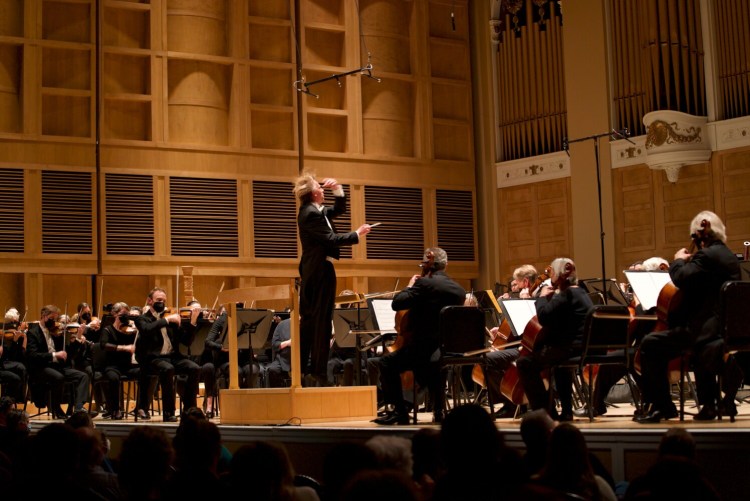A Portland audience saddled up and hit the trail to Merrill Auditorium on Tuesday night to hear the first live, in-person performance by the Portland Symphony Orchestra (PSO) in well over a year.
After being checked for ID and proof of vaccination (with their hands accordingly marked in pen with a “Y”), then having their bodies run through a metal detector and their tickets through a scanner, a masked crowd finally got to see and hear the PSO pay musical visits to the Maine coast, the Grand Canyon and, one could say, the nation’s musical heart in a program titled “Onward: A PSO Homecoming.”
The full-size and mostly masked orchestra performed well under the ebulliently wielded baton of Musical Director Eckart Preu. The concert was recorded for streaming later.
After a stirring rendition of the national anthem, the brief, one-hour (with no intermission) concert featured three distinctive works that suggested the program’s parallel ideas of homecoming and moving onward.
First up was the “Piano Concerto in One Movement” from 1934 by Florence Price (1887-1953). Price has received much deserved attention in recent times. Her music, containing a rich Romanticism enlivened by African-American spiritual and folk traditions, has been rediscovered in a climate that is more welcoming to the formidable artistic contributions of women of color to American culture.

Guest pianist Michelle Cann played Florence Price’s “Piano Concerto in One Movement.” Photo courtesy of the PSO
Guest pianist Michelle Cann, a champion of Price’s work, brought out the concerto’s strength and subtlety, both pushing at the orchestra’s rendering of the piece’s enveloping textures and riding atop its gentler harmonies. The powerful pianist accentuated the work’s place in the forming of a modern American musical identity. The jaunty ragtime rhythms evoked in the final section seemed to spring from what had preceded to announce that optimism, despite the struggles, would greet the new age.
Next, “First Light: A Fanfare for Maine” by Daniel Sonenberg (b. 1970) had its world premiere. The piece was commissioned by the PSO but the pandemic delayed its premiere. Maine is the first state to receive the sun’s rays each morning, a fact that inspired the brief work.
One could not help but think of Rudyard Kipling’s famous poetic line in which he describes a place where “the dawn comes up like thunder.” Sonenberg’s piece starts breezy but hits pretty hard with a brilliant crescendo. “Grab the sunglasses” might be a first thought as his view of a new day in Maine comes to life.
The evening closed with a spirited reading of the “Grand Canyon Suite” by Ferde Grofé (1892-1972). The five-section tone poem, known to many for its usage in western movie and TV soundtracks over the years, also begins with a forceful, though perhaps a touch more nuanced, “Sunrise.”
Musically picturesque themes of deserts and horseback rides follow. The famous refrain of “On the Trail” always seems to find a way into your ears for a stay, and the PSO further confirmed this colorful work to be a classic.
With conductor Preu in full balletic form as he physically drew the orchestra along, the PSO proved the Grofé work to be particularly well-chosen to communicate that, despite any “Cloudburst,” such as that which is musically depicted within the suite, it is important to keep steadily moving along together.
Steve Feeney is a freelance writer who lives in Portland.
Copy the Story LinkSend questions/comments to the editors.



Success. Please wait for the page to reload. If the page does not reload within 5 seconds, please refresh the page.
Enter your email and password to access comments.
Hi, to comment on stories you must . This profile is in addition to your subscription and website login.
Already have a commenting profile? .
Invalid username/password.
Please check your email to confirm and complete your registration.
Only subscribers are eligible to post comments. Please subscribe or login first for digital access. Here’s why.
Use the form below to reset your password. When you've submitted your account email, we will send an email with a reset code.